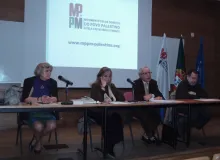To celebrate the International Day of Solidarity with the people of Palestine MPPM organized the «Second Week of Palestine» in Portugal
For the second consecutive year MPPM - Portuguese Movement for the Rights of Palestinian People and the Peace in Middle East - organized the "Week of Palestine", a series of events, aimed at promoting the culture and fight of the Palestinian people, centered around the data of November 29th, proclaimed by the UN General Assembly as the International Day of Solidarity with the Palestinian People. A verse from Mahmoud Darwich's poem "Mural" - One day we shall become what we want - gave the motto to the "Week".This year's "Week" was also associated with the celebration of Jerusalem Capital of Arab Culture 2009, thus corresponding to the appeal by the organizers "to the solidarity groups to promote Jerusalem's historical and cultural identity as the capital of the State of Palestine".Dance: "I Can't"The "Week" began with a dance performance, on the 21st November. "I Can't", created by Sofia Silva and danced by Inês Tarouca, is, in its author's words, "a reflection on the state of war all over the world, focusing on the arab-israelian conflict, more precisely on the question of Palestine and the Jewish State".Held at the Forum Romeu Correia, in Almada, in close cooperation with the local City Council, who included it in its monthly cultural agenda, the event was attended by a large audience of mainly young people who applauded the performance and actively participated in the ensuing discussing with the choreographer on the motivations behind the creation of this work.Sofia confessed that her stay in Palestine in 2008, where she participated in the 3rd International Contemporary Dance Festival, in Ramallah, broadened her views on the Palestinian resistance: "The choreography was changed, opened up a little bit, alleviating the tension, because there must be hope..."The program of the session was complemented with the exhibition of a video recorded by Ana Rita Osório, in the West Bank, where the infamous Apartheid Wall is the main character.Poetry: "Palestinian Poetry of the 20th Century"Poetry took the stage on November, 23rd, at the home of the theater company "A Barraca", in Lisbon.Under the theme "Palestinian Poetry of the 20th Century", the lives of prominent Palestinian poets were evoked by Júlio de Magalhães, who also selected and translated the poems. In his introductory remarks, he emphasized the importance of poetry in the creation of the Arab identity.In what was a memorable night of Palestinian culture, renowned actors Maria do Céu Guerra and João D'Ávila said poems by Fadwa Tuqan ("Enough", "The deluge and the tree"); Tawfiq Zayyad ("Here we will stay"); Samih al-Qasim ("Bats"; "Ashes"); May Sayigh ("Departure"); Mourid Barghuty ("Certainty"; "Exception"); Ahmed Dahbur ("New suggestions"; "The death of the shoemaker"); Hanan Ashrawi ("Death by interment"); Hanan Awwad ("It's time for the knight to triumph"; "Last words of the martyrs in Palestine"); Ghassan Zaqtan ("Darkness"; "Mirror"; "An incident") and Mahmud Darwich ("To my mother"; "Mural").Coloquy: "Life, Thinking and Work of Edward Saïd"On the 26th of November, Palestine went to the University. A colloquy on the "Life, Thinking and Work of Edward Saïd", presented by Júlio de Magalhães, attracted a vast audience of scholars and students to an amphitheater of ISCTE-IUL to listen to Professors Rosa Maria Perez ("The academic life and work of Edward Saïd"), Eva-Maria von Kemnitz ("The orientalism under the perspective of Edward Saïd") and António Hespanha ("The political militancy of Edward Saïd") in what was the most remarkable event on Edward Saïd held for years in Portugal."Stylish, rigorous, erudite, polemical, brave and always guided by the quest for justice", that was how Rosa Maria Perez described Saïd, while commenting on all his work ("Beginnings", "Orientalism", The Question of Palestine", "Covering Islam", "Musical Elaborations", "Culture and Imperialism", "Representations of the Intellectual", "Music at the Limits") and travelling through his life, from his birth in Jerusalem to his late years, with special emphasis on the impact of the 1967 war: "Then, it all changes. The war takes back from the Palestinians the hope of returning home. «Out of Place» shows pungently the imprints the war left in his life". She recalled Saïd's visit to Portugal, in 1997, which she co-hosted with Professor António Hespanha, and the meeting between Saïd and Barenboim that led to the memorable concert at Birzeit University.Eva-Maria von Kemnitz disserted on Edward Saïd's perspective on the orientalisms, as expressed in his seminal work "Orientalism" which she considers to be "a cry of revolt and indignation, from the intellectual and political activist, against the subaltern treatment given to the culture of the other - this being the Arab and Muslim - by the westerners, following their defeat in the 1967 war". Written between 1975 and 1976, under the influence of Saïd's visit to Lebanon, on the aftermath of the civil war, "Orientalism" is considered by Eva von Kemnitz as "a topical work, as proved by the on-going epistemological polemic it causes and the influence it had on the development of the fields of anthropology, gender studies, post-colonial studies, subaltern studies, aboriginal studies, art critic, etc."António Hespanha recalled the process that led to the installation of the Jews in Palestine, from the Balfour Declaration to the unilateral independence of Israel in 1948 and consequent expulsion of the native Palestinians from their homeland, to explain Saïd's uprooting: "All his life was one of ephemerous identities. He always felt that he was out of the place, out of any place, but that only gave him more strength". Sometimes critical of the official Palestinian positions - he rejected the Oslo agreements for leaving out issues that he deemed essential - Saïd considered that "Palestine is not just an Arab and Islamic cause (...) Above all we must, as Mandela never tired of saying about his struggle, be aware that Palestine is one of the great moral causes of our time". Inspired by Saïd's "Representations of the Intellectual", "a lesson on the perceptiveness but also on the humbleness and spirit to serve the intellectual must have", Hespanha concluded that working as an intellectual is also a form of militancy: "That was Saïd's main lesson. He was a great intellectual and, therefore, a great militant".Dinner: "Flavors from Palestine"In an entirely different approach to the Palestinian culture, a meal exclusively composed of Palestinian dishes, prepared under the orientation and supervision of Her Excellency Ambassador Randa Nabulsi, was served on November 27th, to over a hundred diners.Malfuf, Falafel, Hummus, Babaghannuj and Arabic salad were the appetizers introducing the main dish - Palestinian chicken, served with Burghol Mujadara, Fatta and legumes. Harissa and Mahalabia, served with Arabic coffee, completed the meal.A collection of photographs illustrating the life and struggle of the Palestinian people was on display at the room and Palestinian music was played during the dinner.Ambassador Randa Nabulsi and Carlos Silva, from MPPM, made brief speeches emphasizing the political meaning of the event in connection with the International Day of Solidarity with the Palestinian People,Solidarity MeetingThis "Second Week of Palestine" closed, on the 28th November, with a public meeting, jointly organized by MPPM and CPPC - Portuguese Council for Peace and Cooperation, to mark the International Day of Solidarity with the People of Palestine.Moderated by José Neves, Vice-President of MPPM, speakers were: Ambassador Randa Nabulsi (General-Delegate of Palestine), Friar Bento Domingues (MPPM) and Luís Vicente (CPPC).Friar Bento centered his speech on the theme of reconciliation: "Solidarity that does not favor the cooperation between the Palestinian people and Israel only widens the gap, the wall. There are examples in History to show that the way of mutual forgiveness leads to reconciliation and peace". Although recognizing that Palestinians are "the victim of the victims", he considers that Israelis are also victims of their own warlike and self-destructing State: "They live under what they suffered from the Nazis. This is a coverage to do to the others what was done to them. That is destruction. A holocaust only produces holocausts. That is why it is necessary to publicize worldwide all initiatives, all persons, all organizations who think those two people can organize themselves in another way". He concluded with an extensive description of Karen Armstrong's TED Prize 2008 winning project "Charter for Compassion" based on religions universal Golden Rule.Luís Vicente began by evoking the UN Resolution of 29 November 1947 that established the Partition of Palestine and legitimated the creation of the State of Israel. He recalled, then, the aggression by Israel against the Palestinian people, in Gaza, initiated on 27 December 2008, that he classified as "an ignoble massacre and an unprecedented humanitarian catastrophe, a crime against a people, against all of us, that was not a war -it was a siege, followed by a massacre, a genocide". He drew a parallel with the Jewish situation under the Nazis, to denounce: "All the Palestinian civilian population is the object of a genocide commanded by the Israeli government. If we ignore this, who will cry ‘Warsaw ghetto, never more!', ‘Auschwitz and Birkenhau, never more!' ‘Treblinka, never more!' ‘Gaza, never more!' ‘East Jerusalem, never more!' ‘West Bank, never more!'?". And he pointed the solution: "To enforce UN Resolutions on the Middle East, to lift the blockade on Gaza, to free the political prisoners, to dismantle the settlements, to remove the separation walls, to establish the State of Palestine with East Jerusalem as capital, to allow the return of the refugees".Ambassador Randa Nabulsi remembered that Jerusalem was designated by ALESCO Capital of Arab Culture 2009 but that all celebrations had to be made abroad, since Israel had forbidden all initiatives in Palestine. She then recalled that the fulfillment of the 1947 UN Partition Resolution, namely the creation of the State of Palestine, was the condition for the admission of Israel in the UN, but that never happened. On the contrary, the territory allotted for the Palestinians is being reduced and present Israeli policy reserves for them only 12% of the entire territory, fragmented in a way that prevents traditional social life! Emphasizing that Palestinians are a peace-loving people, Ambassador Nabulsi admitted that there was hope when two honest leaders, Yasser Arafat and Yitzhak Rabin, agreed on important matters: "PLO recognized Israel as an independent state and Israel recognized PLO as the representative of the Palestinian people. They spoke of the peace of the brave and we were sure it was achievable. Rabin accepted to stop the settlements: that cost him the life". Disappointed with the present situation, she warns: "Now is the moment of truth. There are not many choices: either the world shoulders his responsibilities or we are subject to the law of the jungle".

